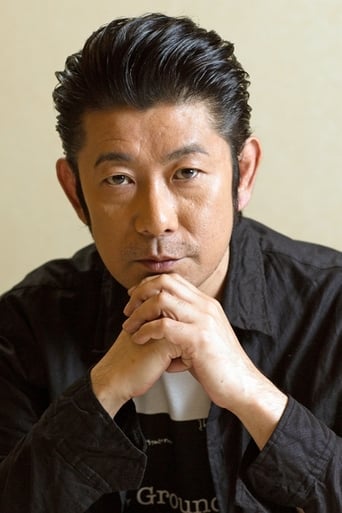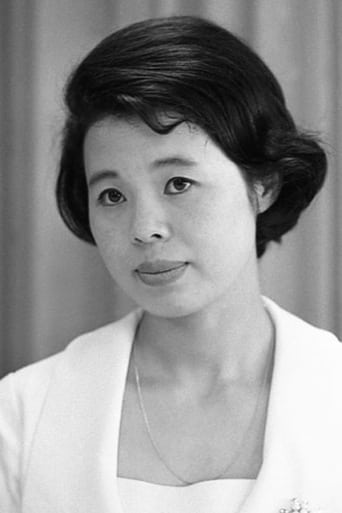GamerTab
That was an excellent one.
Mjeteconer
Just perfect...
AutCuddly
Great movie! If you want to be entertained and have a few good laughs, see this movie. The music is also very good,
Portia Hilton
Blistering performances.
lasttimeisaw
Internationally acclaimed Japanese auteur Naomi Kawase's 8th feature, SWEET BEAN sets its three-generation confluence in a small dorayaki shop, the owner Sentaro (Masatoshi Nagase), a middle-aged loner paying his dues to his troubled past, a septuagenarian Tokue (Kirin Kiki), who wins the co-worker vacancy with her bean paste, made from her homegrown recipe brims with deference and care to the beans, and a secondary-school pupil Wakana (Kyara Uchida), who frequents the shop and may relinquish the possibility of a higher education due to pecuniary deficiency at home. Naomi's feminine adroitness permeates from the start go, a lackadaisical Sentaro begins his quotidian grunt work in his perennially glum mood, against a beauteous streetscape dotted with cherry blossoms as if we too, can vicariously smell their flagrance. The advent of Tokue, like a gentle breeze, both leavens the taste of Sentaro's dorayaki and his woebegone life, the narrative takes a leisurely and pretty predictable course in the trio's interactions, heedful to details and not spoon-feeds us with their jeremiad. Soon, it is Tokue's wretched past emerges to the forefront, suggested by her gnarled fingers and deformed hands, she is indeed a victim of leprosy, had been secluded from the society in a sanatorium along with her likes for decades. The sticking point of prejudice against Tokue's condition looms large, and begins to disintegrate their business success, in an almost wordless segment, Tokue knowingly bows out, and by the time Sentaro and Wakana finally visit her in the verdant sanatorium, Tokue looks rather anemic and we realize, the elision of lachrymose and saccharine is right around the next corner. The film may as well bring down its curtain there, without gilding the lily with the subsequent voice-over heavy addendum from both Tokue and Sentaro, the former passing her final animistic wisdom to exhort him (and audience alike), whereas the latter, finally lets on his tale of woe in misty-eyes.What comes off squeaky clean is the two central performances, the venerable Kirin Kiki brilliantly conveys Tokue's senescence with sublime precision and then countervails it with a buoyant earnestness, balancing a fine line between dotty and astute, but never for a minute, sags into self- pity or mawkishness. In the case of Masatoshi Nagase, who is slated for a very different task to grapple with, Sentaro is in a way, self-ostracized under his carapace of miserabilism, and Nagase commendably curves out a lucid contour of Sentaro's inscape with great restraint and subtlety. In the main, SWEET BEAN is a potently therapeutic melodrama, a tad errs on the side of sentimentality, but it is more like a fly in the ointment than a wrench in the works, moreover, Naomi Kawase's humane tack of storytelling and gossamer tangibility of the mise-en-scène, do speak volumes among the burgeoning conglomerate comprises of the ever-expanding working female filmmakers today.
Michael Floro
During the film I asked myself how the Naomi Kawase films leave me so inserted in interlacing of so deep and - at the same time - indescribable feelings. Melancholy, but a sweet melancholy, which mixes a sense that there are many things wrong in life, but despite all that we still have to give us to others and to world. I honestly could not answer my question well beyond this identification... But I accepted that this is part of Kawase films. "Sweet red bean" is, for me, as good as "Suzaku" (another great film of this more than excellent Japanese director) and as beautiful as "Tou ze" (Ann Hui, 2011). "Sweet red bean" touched me deeply. It's saved in the bottom of my heart.
CountZero313
The manager of a small pancake stall finds his product is suddenly a neighbourhood sensation after an old woman shows up and changes his recipe. But old prejudices rear their head to scupper short-lived happiness.This is a relatively prosaic outing for writer-director Kawase, a film that eschews the lyricism and frustratingly enigmatic self-orientalising tropes of Moe no Suzaku or Mogari no Mori, for a greater concern with narrative cause-and-effect. Masatoshi Nagase is suitably brooding and mysterious as the weary manager of the stall, tolerant if not indulgent of the inane chatter of schoolgirls who occupy his workplace like a clubhouse. Kirin Kiki is her usual charismatic and maverick self, managing to bring humanity and pathos to a role that could easily have been cloying and maudlin. The storyline of the older women bringing hope to a man with a crushing past works well, Tokue proving a catalyst to stop the manager going through the motions and start living again. The film also functions as an educational piece on the discrimination historically meted out to sufferers of Hansen's disease, or leprosy, in Japan. This part is less effective, following the well-worn trope of having a schoolkid come along so the adults can relate the hidden history she knows nothing about. Heavy-handed and flat, it ill-serves the narrative, and slightly trivializes an ugly but fascinating aspect of Japan's social history.Kawase does not totally leave behind her shamanistic/animistic leanings: there are the usual hand-held shots of sunlight glinting through treetops, and some cod-philosophy on the power of the moon. She hones excellent performances from Kirin and especially Nagase, whose edges seem all too brittle and authentic. A small film with a big heart, that makes a quiet but powerful point.
Kenji Chan
Tears rolled down from my eyes while watching An. The movie reminds me of the evils of discrimination. Unique and beautiful, everyone deserves love. Also, it is important to throw oneself heart and soul into everything one does. Let's say NO to a flippant attitude and I hope my students can understand that constant efforts yield success. Moreover, this touching movie reminds us to treasure what we have and not to take everything for granted.Although the story is rather simple, the film is worth watching because of Kirin Kiki, one of the best Japanese actresses. Her acting is beyond compare. I totally feel for her character, who stays positive and truly appreciates the beauty of the mother nature despite her sad story. Masatoshi Nagase is impressive too. He subtly expresses his suppressed frustration, in spite of his long silences at the beginning of the film. I also love his performance in another film, Kano. Apart from the capable leads, the cinematography is awesome. The four seasons, the food and the mother nature are beautifully captured.Like red beans, life is bittersweet in nature. Nevertheless, the elderly woman's secret recipe for truly transcendent dorayakis reminds us that we are able to get rid of the bitter taste, with a good attitude, smiles, effort and love.





